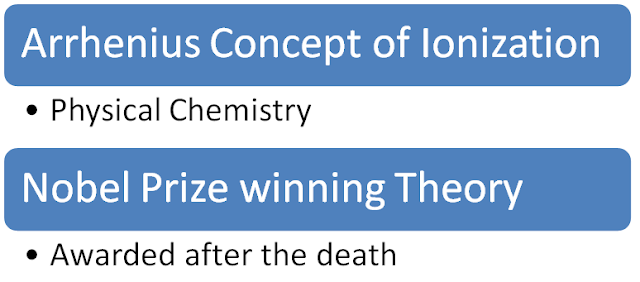Arrhenius Concept of Ionization
Arrhenius has given a concept for the ionization. He was given the Nobel Prize for his concept after his death.
The postulates of Arrhenius Concept of Ionization are listed below.
a. The breaking down a substance into two oppositely charged ions by the action of an electrolyte is termed as Ionization.
b. Ionization process equal positive and negative charge. Hence, the overall solution is always neutral for ionization.
c. The negatively charged ions move towards anode and the positively charged ions moves towards the cathode because of mutual attraction between charges of different nature.
d. The extent of the ionization of a substance is given by the degree of ionization of the substance. It is denoted by α.
Mathematically,
α = (Amount of ionized molecules/Total number of molecules)
e. Normally, the value of α for strong electrolytes is nearly equal to 1 and that of a weak electrolyte is far less than 1. This is because strong electrolytes are more ionized in comparison to the weak electrolytes normally.
f. Ionization is a reversible process because the process of breaking down of a substance into ions and re-formation of the substance by the accumulation of those ions occurs simultaneously. Hence, there occurs a dynamic equilibrium.
For example:
NaCl ---------> Na(+) + Cl(-)
This reaction is reversible in nature because of the simultaneous formation of Na(+) and Cl(-) and their accumulation for regenerate NaCl.
g. 100% ionization is impossible. It is possible only in case of infinite dilution.
Factors affecting ionization
The factors affecting ionization are listed below.
1. Nature of electrolyte
Normally, strong electrolytes ionize more than the weak electrolytes. Hence, the nature of electrolyte used alters the ionization process.
2. Temperature
The ionization of a substance increases with increase in temperature. Experimentally, it was found that the rate of ionization of a substance increases by 2 folds with each 10 degree Celsius rise in temperature.
3. Dielectric Constant
Dielectric constant is the ability of an electrolyte to weaken the bonds present in a substance ultimately leading to ionization. In fact, the more the dielectric constant, the higher is the magnitude of ionization.
4. Dilution
In case of strong electrolyte, the rate of ionization decreases with increase in dilution whereas for a weak electrolyte, the rate of ionization increases with increase in dilution.

Comments
Post a Comment